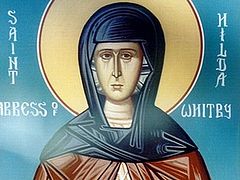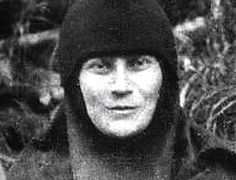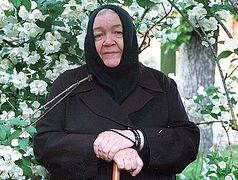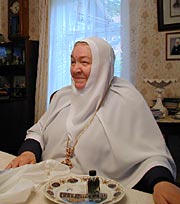
- Mother Varvara, you have been Mother Superior of the convent for over 30 years…
- Thirty-five, this year it will be thirty-six.
- It is well known that the Holy Patriarch Alexy loves your convent…
- Right, the future Patriarch Alexy used to help the convent a lot. For the first time he visited it being an infant. And in 1952 when I came to the convent, he was already head priest of the Yikhvia church. He is only a year my senior: I was born in 1930, and he – in 1929. So then I was 22 and he was 23. Every year he visited Piukhtitsy with his parents. He was a slim, scrawny young man. Quite a strict one – one look of his was enough… When he served as the head priest, people loved him. Many people from the Yikhvia parish visited our convent. And he always found time to go somewhere with them. A very united parish they were. The young head priest was very popular. His father had been a priest in the Tallinn Kazanskaya church. His mother had done a lot to nurture well her only son. I remember people saying when they came: “Oh, Father Alexy with his mom and dad arrived”. His father was very popular – he was a very kind priest. If he was given something in his right hand – he gave it at once away with his left hand. That’s the sort of father he had. He died in 1961 in Tallinn and was buried there. I did not see it myself, our schemanuns told me (the deceased Mother Fotina, Mother Lubov, Mother Helen) – all of them remembered him being a boy. He used to come with his parents, to help with cropping, gleaning the field or digging out potatoes. Then everybody gathered together to go back from the field, and he walked in front along the path through the forest. All at once he disappeared. In fact one could choose the way among the groves. Where is Aliosha? A few minutes later he suddenly showed up.
- Where have you been, Alioshenka?
- I’ve been to the forest, and here are mushrooms for the refection, - solemnly he gave over the basket, - I gathered these mushrooms for the refection.
He was beloved because he helped everywhere and managed to do everything.
- I have heard that it was Vladyka Alexy, the actual Patriarch, who blessed you for the position of Mother Superior. Could you tell us how it happened?
- I entered the convent when he served in Yikhvia. We worked here in the fields, everything was done manually. We had no trucks or tractors, but very good horses. When I came, Mother Superior Rafaila asked me:
- Valya, can you mow grass?
- No.
- And can you cut the crops?
- No.
- And can you milk cows?
- No.
- What can you do then?
In fact I had never worked in the field before and never seen it, but I said:
- If somebody teaches me, I will learn to do everything.
The Mother was very kind and said:
- All right we’ll teach you.
I was twenty-two then, I was strong and they started to teach me to mow. At that time the convent manageress was Mother Iosafa. We had to walk a few kilometres to get to the meadows, and the horses carried our bags. We left for mowing for a whole week and spent the nights in the fields. We had meadows in Syrenets, in Yamy. I said to Mother Iosafa:
- Teach me, for I feel ashamed. I do not know how to do anything, but I’ll learn it.
Mother Iosafa caught me by the waist and turned me round – certainly, with the scythe in hands. “O Lord, let my soul stay on earth for repentance!” came to my mind. I learnt to mow, to cut crops and dig potatoes. We cut down big trees and I learnt to chop off knots. Once they put me on a horse and said:
- Valya, here is Gipiur (or Maika), - I myself had never held reins before, - will you manage it?
- I will.
I took the reins. Three times I flew head over hills under the horse. And not a single time the horse stepped on me. God saved me for my obedience. That’s how we worked. When we started there was nobody around. The Russians were few here. When mowing we lined up in a row, and after a few passes we were told: “You may have a rest for 15 minutes, girls, sit down”. All of us sat down right where each was standing, and we started doing whatever we liked: singing, making beads, cutting crosses, or reading aloud. Most of all I was asked to read aloud: “Valya, read for us”, and they were sitting and listening to me. This way the time passed in work and cares. Summer is a special time, you know, from sowing till harvest: each day we were in the fields. And during haymaking we did not get back from the meadows before twelve. It was hard work, and Father John of Kronstadt used to say: “Dear sisters, just do not murmur, ye from Piukhtitsy, just do not murmur. For you it is only three steps to the Kingdom of Heaven, so just do not murmur.” And it was true, for the work was really hard, but we stood it.
I lived here for four years, and then Mother Georgia and I moved to Vilnius convent. My married sister lived in Vilius and when I knew nothing about Piukhtitsy yet, abbess of the Vilnius convent Nina wanted to take me there. But in the 50s it was too difficult to get residence registration in the capital. The Mother promised me: “When I settle the issue of your registration I will take you in”. And I thought: “Why should I wait for the registration?” And in 1952 I decided to join the Piukhtistsy convent. From the pilgrims who visited us Mother Nina got to know that I was accepted in Piukhtitsy. And they also helped to start our correspondence. Once she wrote to me: “Come, I will take you in”. At that time blessed Mother Katerina lived in Piukhtitsy. And when Mother Georgia and me decided to go to Vilnius, Mother Katerina blessed us: “Go there. It will be a long-time trip for you”. And it came true: in the Vilnius convent we lived for twelve years. Spiritually it was very good in Vilnius. But we certainly missed Piukhtitsy and wrote letters to the sisters there. Abbess Nina was born in 1873, and she died at the age of ninety-six years governing her convent till the last day. Here I got to know Father Nikolai Gurianov.
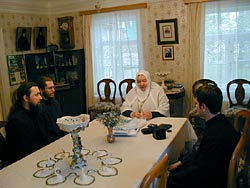
- Your Holiness, I am unworthy to be abbess.
- It will be your penance to be abbess. And they will do fine in Vilnius without you.
So twelve years after my coming to Vilnius the Patriarch issued the decree, and I was transferred to Piukhtitsy. I was admitted to monastic mantle. Before I had been Valya, then I became Varvara. It was not easy to leave the Vilnius convent. During the twelve years I grew very close to Mother Nina. But for the Vladyka I was a Piukhtitsy sister – that’s the long and the short of it. I was chosen and appointed, without being asked: “Would you like it or not?” Vladyka Alexy was very laconic and said only: “You will manage it as your penitence, and in Vilnius we will find somebody to help Mother Nina”. So I became abbess as a penance.
- Is it true that you refused, but the future Patriarch Alexy put the abbot’s cross on your neck?
- It is true, but I cannot tell you everything. It was not quite a refusal… Well, I’ll tell you nothing more. I was given the order and sent to Piukhtitsy. I said: “No, I will not be abbess!” And they replied: “Yes, you will!” – “No, I won’t!” – “Then where is holy obedience? Where is your humbleness?” I prayed a lot, I cried a lot, I asked Mother of God for that not to happen. How can I be abbess? At first it was hard. In Piukhtitsy there were about a hundred people: I remembered one half of the sisters, and the other half were unknown to me. There was a big household with a farmyard. I went to the convent like for the feat of arms. In those years, you know, all the nuns had to be heroes. We did not have any pilgrims at that time…
When I arrived here, sisters met me, and I was walking more dead than alive. What will I do? How? What should I begin with?
- How did the sisters receive you? You were kind of from a different convent.
- You know, the sisters received me well. The majority of them knew me: they remembered me come to the convent and work with them. The other half of the sisters who were not acquainted with me also showed a kind attitude to me. Vladyka Alexy helped from the very beginning, and we could invite construction teams. The Vladyka and our engineer Ivan held a discussion and planned what should be done. First we set up an electrical substation, then drilled a 156 m deep well and installed a pump. During the first year we arranged coal heating. At first it was in the cathedral, then in the refectory, and later it reached all the houses, though in the beginning we had to saw and carry firewood ourselves. It was hard, but OK. And His Holiness, may God grant him good health, thought of every detail. Earlier there were two wells in the convent that had almost no water in summer. Now they drilled a deep well. People helped us a lot, so much that I could help also other churches. Some had nothing to cover roofs with, some had no money to pay for their insurance. Our diocese was not rich. Mainly poor priests visited us, there were many of them! We helped them with books and icons. With God’s assistance we could do it. And Vladyka Alexy helped us not only with the household; he was our spiritual guide. He grew very attached to Piukhtitsy. It became his home cloister. I can say it was he who raised the convent. And we only fulfilled our penance running here and there. I can’t believe I have lived till almost eighty…
- I have heard that His Holiness himself unloaded coal for you…
- Many times. Once he arrived during the first week of the Great Lent. Right then coal was brought. I asked him:
- Vladyka, where are you going to?
- To unload the coal. And don’t you dare go too, he said.
I replied:
- I am going too.
- No, no, no, - and he went and unloaded the coal together with the sisters.
Or if he found unchopped firewood he would say:
- Give me a wood-chopper, - and he would go and chop wood.
Now, when His Holiness arrives, we go to the spring first. Then to the farmyard, there he feeds all the animals. Especially he likes calves. And if he comes to the stable, Mother Iosafa prepares big slices of bread, sugar – sisters bring it all in baskets and he feeds. Horses stretch their necks and he feeds them over the fence with bread, and then with sugar. As soon as we approach they start to neigh and stamp. And he feeds all of them, dogs and calves too. And our cows are funny, cunning and a bit spoilt. If a cow gets a sugarplum, it spits it out. If it gets a soft candy, like chocolate it eats it up and tries to get into your pocket. Vladyka brought many bishops and various delegations to us. The cows always head directly to pockets.
- These nunnies, Vladyka said, can teach anyone, may it be piglets, or calves, or whatever else, to live on chocolates.
Everybody laughed.
- They say bishops could have a good rest in the convent…
- Yes, Vladyka brought bishops to us, he was simple talking to them and everybody saw it. He liked to travel to village Yamy – it was his favourite parish, because when he served in Yikhvia cared for the Yamy parish. And the parishioners loved him: “Our Father Alexy will come soon!” – and they waited for him to serve the Liturgy, or a moleben, or a panikhida, or preach a sermon. Then he would go to Syrenets to visit Father Vladimir, and then - to Chudskoe lake to sit with his guests at the bank for 15-20 minutes treating them with watermelons. Nizhny Novgorod metropolitan Nikolay liked to visit us. Once in winter I went out and could hardly believe my eyes. At the bishop’s house Vladyka Nikolay was clearing away snow.
- Vladyka, what are you doing?
- I am earning for a piece of bread for breakfast.
Vladyka Alexy came out too, and I tried to complain to him about Vladyka Nikolai. But he replied:
- Oh yes, I see. But it is really a shame; one should work for his piece of bread, and started to clear the paths together with the sisters.
Fellowship with him was easy and enjoyable. His Holiness was very simple. He only seems to be strict, but there is nothing strict in him. Perhaps, only his look… Once when he threw a strict glance, I asked him:
- O Vladyka, I think you are strict.
- Oh really? Ha ha ha! – that was his strictness just for a second.
Vladyka Alexy loved the clergy, he never transferred priests without need. He took special care of Estonian priests. When priests visited the diocesan administration, they never left without having lunch or at least tea.
And there we have Vladyka’s pine hills. He went to these woods for mushrooms. He took protodiacons, deacons, priest, convent sisters to the woods and invited me too:
- Mother!
- Dear Vladyka, no time, I’ve so much to do.
- No way, assign all the work to sisters and come with us to the forest!
I really had no time for it: now I had to run to the workers on the hill, now to the fence, now to the construction site, now to the farmyard.
- No way! Leave all your work! We go for mushrooms!
Without Vladyka I never gathered mushrooms – I did not have time for it. We gathered full basins and baskets with mushrooms. We even have photos in our albums.
He performed all admissions: to ryasophore, to mantle and to schema. He himself cut their hair and I covered sisters with ryasophore. This way he participated in the convent life. Everything was very simple; one could always ask him for advice and talk to him.
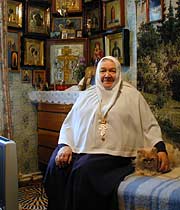
- Earlier there were two monasteries. Pechery belonged to Estonia earlier and only after World War II it became a part of Russia. Now we are the only one. But the Estonians like our cloister. Many get baptized, even whole families come for it. We have two Estonian priests: Father Samuil and Father Antony, as well as two brothers: Filaret (with His Holiness in Sergiev Posad) and his brother Daniel serve in Estonia. They are brothers, they were baptized, and their parents cannot put up with the refusal of their sons to get married: one of them is a monk, and another is a celibate. Very good young men, I knew them from their childhood. They wanted to get baptized only in Piukhtitsy. Many Estonians come to us. We live with them as we used to.
If they need something:
- Mother, can you help?
- Sure, anything we have.
If we need something:
- Will you help us?
- With pleasure.
It was like this both in the Soviet time and today.
- Is Orthodox faith attractive to Estonians?
- It is. Thought the elder people are afraid to “betray their parents” as they put it. I do not understand this. I can tell you a story from the 80s. Once our militia officer for church affairs came and asked:
- Mother, baptize my Andrius and me.
- Sorry? - I looked at her with surprise. I did not know her well at that time; she looked like a go-ahead woman.
- Baptize me and my boy, Mother.
We baptized them. His Holiness had great respect for her. When she was the officer for church affairs, she was very active and always helped us. Before the celebration of the 1000-year anniversary of baptism of Russia we needed asphalt – she helped: we managed to pave everything.
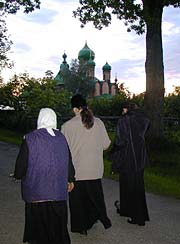
- You know, our convent is not an ancient one, it is only 112 years old. These houses were always home of Mothers Superior. After the convents’ foundation there were only six abbesses. The first outstanding Mother Superior – the Builder and the Founder of the cloister – was abbess Varvara from Kostroma. Being ten years of age she came to the Kostroma convent with a doll that she hid in the garret. The abbess did not know what to do with the future founder of Piukhtitsy cloister. Vladyka Pallady wrote a note to her: “Mother, take this girl, she is a chosen vessel of God’s grace”. The abbess read the note and said to the girl: “Well, you may come. You’ll live with us”. The girl was accepted to the convent. At her free time she played with the doll and sewed nun’s clothes for it, that is she had a nunny in the garret.
One day the abbess said to the girl:
- Before the feast we will all confess.
- Oh Mother, I have a very big sin; I cannot even tell you about it.
- Why, Lisa, why can’t you tell me about it?
- No Mother, I am afraid to tell you. I have a big sin. Do you know what it is?
No, I don’t.
- I have hidden a doll in the garret and I sewed nun clothes for it.
- Bring me this doll, my daughter.
The girl obeyed and brought the doll, for which she had already sewn a mantle, a cassock, a klobuk, and even beads. She herself was quite small, but could already knit. The Mother shed a tear, hugged her and said: “That’s the big sin you have! So take this doll and play with it as much as you need. I allow you this, and you will even get time for this.”
This story happened in 1888. That is what our first Mother Superior was like, who founded our rather small convent.
At first there was nothing in this place, only in Yikhvia (at the railway station “Yikhvia”) there was a Baltic brotherhood. So Mother Varvara was the head nun there. She was sent to Kostroma to found a cloister. There Varvara and some hospital nurses arranged a home church. Some time later more sisters came and founded a convent. There was nothing in this place, only a blank hill.
At that time Sergey Shakhovskoy was the governor of Estland, as our land was called at that time. He lived with his wife Elizabeth in Tallin. Sometimes they came to the hill where the Sergius church stood. We called this place Mount. At the terrace where now there is the church there was a summer cottage. They found this place where four hundred years before the appearance of God’s Mother’s icon had taken place and a chapel had been built, and they liked the place. Mother Varvara also began to come to the chapel and then to build a church with God’s help and with the blessing of Fr. John of Kronstadt. He helped her all the time and often visited abbess Varvara. So all the offices were moved from Yikhvia to the Mount: a small hospital and a needlework shop.
At first the services were held in the Nicolas church, there was a small parish here. Then the convent was founded, where Mother Varvara was appointed abbess. Convent did not have much land: some land was bought, some was granted by the government, some was presented by the Duke and the Duchess. The rules were made up similar to the rules of the Kostroma Anastasius cloister. They prayed and sang in two languages: in Estonian and Russian. An orphanage and a school (which stands there till now) were opened. In such a way Mother Varvara developed the Piuktitsy convent. She taught sisters singing and reading, handicrafts and sewing. She organized a shoe shop and other shops. Unmarried girls and widows started to join the convent. Some of them came first to the orphanage and then stayed in the convent. Girls grew up: some became hospital nurses, others married priests (the Mother provided a dowry for them), and some of them entered the convent. On the purchased land they sowed rye and wheat and built houses where we now live: the five wooden houses are the houses built under Varvara, the first Mother Superior. At that time she said: “My children, these are temporary lodges, but some day we will build you stone ones.” She passed away a long time ago, but we have lived in her “temporary lodges” already for one hundred and twenty years. That is how our cloister grew up.
Once Fr. John of Kronstadt went to the spring with the Mother and said to her:
- Mother Varvara, have a look - there is such a wonderful cathedral on your hill.
- I wish, but we have nothing to build it of.
He did not listen to her and repeated:
- Mother, there is such a wonderful cathedral on your hill, just have a look!
The Mother did not see anything and says:
- Father, it is clear, but…
The Father said for the third time:
- Mother, there is such a wonderful cathedral on your hill; the Antichrist will not approach it. God’s Mother will keep your convent, and you will never be in need of anything. You will not be rich, but will always have enough food. If you work you will be fed.
And I add also to the sisters: “Dear sisters, do not dream too much of what Father John said. Very much depends on how we live and behave. If we love people, are hospitable to them, giving them roof and food – then God’s Mother will never leave us alone. There. Do not dream that such a cathedral will appear by itself and that Antichrist cannot come here. It depends on how we live”.
Today there are 172 people in the convent. During World War II it was front zone. When our troops were retreating the Germans bombarded them. Our cathedral built in 1910 was a reference point for them. They would fly up, bombard us, but all the bombs would come down outside of the walls in our kitchen gardens – not a single one hit the cathedral. When the Russians took the offensive it was the same. Often they would fly up in clouds and bombard without aiming. And again all the bombs were beside the cathedral. Not a single house war destroyed. Only an old wooden bell-tower on the hill was pulled down by a blast wave. Instead of it we built a new bell-tower of the same size. A few years later the pilot who had bombarded us came to Mother Rafaila and asked: “Mother, tell me, what protected you from our bombardment?” The Mother answered him: “God’s Mother did. Follow me, I will show you a wonder-working icon that appeared here four hundred years before. Here its, our Intercessoress, our Protectoress”. He said: “It is She. When I was flying to bombard the convent, suddenly in the air before me there appeared a women in blue and said: “Son, do not destroy my house” – and she disappeared”. Mother Rafaila burst into tears, showed to the wonder-working image and said: “Here is our Protectoress”.
The interview with abbess Varvara was taken by the brethren of the Sretensky monastery.
Photos by Provoslavie.Ru

